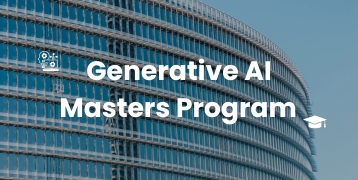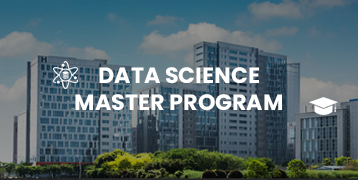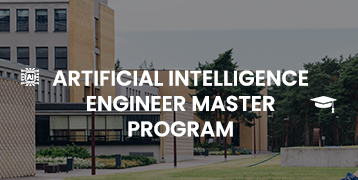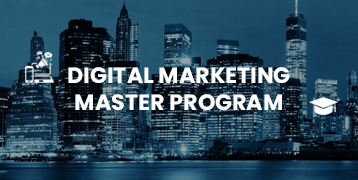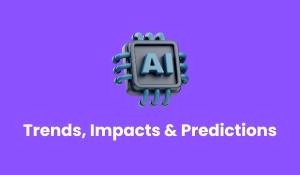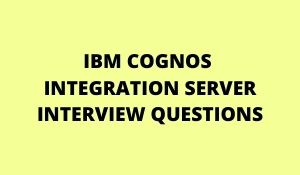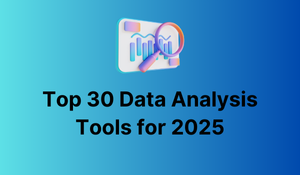
Introduction to Data Analysis Tools:
Data analysis Tools are a set of applications designed to gather, transform, and analyze data to Provide understanding, recurring patterns, and movements. They support tasks such as data purification, statistical examination, graphical representation, forecasting, artificial intelligence, and documentation. Categories encompass statistical applications, business analytics (BI) applications, large data applications, artificial intelligence platforms, and graphical data representation applications. These applications assist users in executing intricate computations, producing reports, creating forecasting models, and understanding data efficiently.

How Data Analysis Tools Are Used in Real Life:
Data analysis tools are crucial in various industries for business decision-making, marketing, financial forecasting, healthcare, supply chain management, research, human resources analytics, and fraud detection. Retailers use Power BI for sales data analysis, while financial analysts use Excel, Python, and R for risk modeling. Healthcare uses Tableau for patient recovery visualization, supply chain management uses Apache Spark, and researchers use MATLAB or R.
Here we can GoLogica provide Some Data Analysis Tools and their key features, and real-world applications:
- Python
- R Programming Language:
- Tableau
- Apache Spark
- Microsoft Power BI
- SAS
- KNIME
- QlikView
- Excel
- Jupyter Notebook
- RapidMiner
- Apache Hadoop
- Talend
- Looker
- TensorFlow
- IBM Cognos
- Microsoft Azure
- MongoDB
- PyTorch
- Scikit-learn
- Sisense
- Splunk
- Apache Storm
- Apache Spark
- SQL
- BigQuery
- Alteryx
- MATLAB
- IBM SPSS
- Orange
Python:
Python is a programming language and its flexibility, significant libraries (which include Pandas, NumPy, and SciPy), and potential for integration with many tools make it a no-brainer for data wrangling, statistical analysis, and machine learning. And it just keeps getting bigger, thanks to its open-source community, which continually supplies new tools.
Key Features:
- The programming language is designed to be very readable and writable.
- Popular libraries include:
- NumPy: For numerical computations.
- Pandas: For data manipulation and analysis.
- TensorFlow and PyTorch: For machine learning and deep learning.
- Django and Flask: For web development.
Real-world Applications:
- Cyber security professionals for testing the vulnerabilities of networks and systems.
- These include managing cloud infrastructure, automating server configurations, and monitoring network performance.
- Google applies Python and TensorFlow to drive AI apps in image recognition and natural language processing (NLP).
R Programming Language:
R is an open-source programming language and software environment, especially for applications in statistical computation and data analysis along with graphical representation. R has been widely used as one of the most generalized tools by a large number of data scientists and statisticians, solely because of its improved capabilities for data manipulation and visualizing representations.
Key Features:
- Data Analysis in Healthcare
- Data Visualization
- Integration with Big Data Tools
Real-world Applications:
- R is frequently used in bioinformatics to analyze genomic data.
- Financial Services and Risk Management.
- Marketing Analytics.
Tableau:
Tableau is a powerful tool for visualization, making raw data interactive and visually attractive formats. It supports every level of skill; therefore, the users may analyze data, derive insights, or make decisions based on the data.
Key Features:
- Advanced-Data Visualization
- Interactive Dashboards
- Tableau ensures that data is governed and secure.
- Artificial Intelligence and Machine Learning Integration
Real-world Applications:
- Tableau, renowned for its flexibility and data visualization
- Across various industries for data-driven decision-making
- Operational optimization, and gaining insights into customer behavior and market trends.
Apache Spark:
Apache Spark is a freely available cloud computing framework developed by UC Berkeley. It enhances the processing of big data sets by leveraging in-memory features, supports a variety of programming languages, and interfaces with diverse data storage solutions.
Key Features:
- Spark supports various data processing tasks, machine learning, and graph processing.
- Improving computation speed compared to traditional disk-based frameworks like Hadoop.
Real-world Applications:
- Amazon and eBay utilize Spark for real-time analysis of user behavior and preferences.
- Spark is utilized by financial institutions to evaluate risk by analyzing transaction data, market conditions, and historical trends.
- Telecom companies efficiently analyze real-time network performance data, thereby enhancing resource allocation and service quality.
Microsoft Power BI:
Microsoft Power BI provides a simple tool to analyze business data. It lets users show data, share findings, and work together. This helps companies make smart choices.
Key Features:
- Power BI provides data connectivity, modeling, visualization, interactive reports, collaboration, and mobile accessibility.
- Enabling data transformation, cleansing, and sharing for data-driven decision-making.
Real-world Applications:
- Microsoft Power BI is a versatile tool used in various industries
- It helps in financial reporting, healthcare analytics
- Its intuitive visualizations and robust reporting capabilities provide valuable insights.
SAS:
SAS (Statistical Analysis System) includes a set of programs to examine data in depth, gain business insights, manage information, and predict trends. This allows companies to make better decisions, boost their operations, and learn from complex data sets.
Key Features:
- SAS is a robust data management software for various industries
- Offering advanced analytics, visualization, and predictive modeling.
- It supports machine learning, artificial intelligence, and data mining techniques for data security.
Real-world Applications:
- SAS is a widely used data analysis tool in various industries:
- Patient data analysis
- Credit risk assessment
- Fraud detection
- Inventory optimization
- Supply chain efficiency, and policy analysis.
KNIME:
KNIME (Konstanz Information Miner) is a free software package to analyze data, create reports, and combine information. Many industries use it for AI, data exploration, and business analytics.
Key Features:
- KNIME is a data management tool with a visual workflow interface
- Advanced machine learning tools, and visualization capabilities
Real-world Applications:
- KNIME is utilized in various industries for:
- Risk analysis
- Fraud detection
- Customer segmentation
- Historical data analysis, and optimizing network performance.
QlikView:
QlikView is a powerful business analytics tool that creates interactive dashboards and reports to examine data. It helps companies make informed decisions using current information.
Key Features:
- QlikView is a data analysis tool with a unique model
- Interactive dashboards, and visualization options
- Promoting data-driven culture
- Collaboration, and mobile accessibility.
Real-world Applications:
- Finance
- Healthcare, retail, manufacturing
- Telecommunications
- Education, and policy impact analysis.
Excel:
Excel plays a key role in many areas like finance, sales, marketing, project management human resources, education, healthcare, and business reporting. People use it to budget, analyze investments, and handle data.
Key Features:
- Calculations, Visualization, Pivot tables, and automation for collaboration and productivity.
- Enabling businesses to understand audiences
- Optimize marketing, and gain insights into product performance and revenue.
Real-world Applications:
- Website optimization
- Digital Marketing
- E-commerce performance monitoring
- Content strategy development
- Conversion tracking, and event tracking.
Jupyter Notebook:
Jupyter Notebook is a free, web-based tool that allows individuals to develop and distribute documents with interactive code, mathematical formulas, graphs, and written content, all aimed at aiding in data analysis and scientific calculations using Python.
Key Features:
- Interactive coding offers real-time debugging
- Inline results display
- Supports Python
- Visualization integration
- Collaboration
- Independent cell reruns, and plugin-supposed.
Real-world Applications:
- Data science and analytics are crucial in finance
- Marketing, and education
- Employing machine learning, and programming concepts for autonomous driving.
RapidMiner:
RapidMiner is a data science tool. It helps you create set up, and take care of machine learning models. You’ll find it easy to use when you need to get your data ready, look at it, and make guesses about what might happen next.
Key Features:
- The tool streamlines data analysis and machine learning processes with a drag-and-drop workflow design.
- Pre-built algorithms
- Data integration
- Automated machine learning, and programming language extensibility.
Real-world Applications:
- This summary discusses various applications of data analytics
- Including customer churn prediction
- Fraud detection
- Marketing segmentation, which helps businesses identify potential customers
Apache Hadoop
Using computer clusters, Apache Hadoop is an open-source platform for distributed processing and storing of massive datasets.
Key Features:
- Hadoop Distributed File System (HDFS)
- Fault Tolerance
- Distributed Data Processing
- MapReduce Framework
Real-world Applications
- Hadoop is a crucial big data tool for data warehousing, analytics
- Retail, financial services, and healthcare, handling massive datasets
- Optimizing supply chain operations, and managing risk.
Talend
Talend is an open-source platform for managing data. It makes it easier to collect, transform, and process data. It also helps with data quality and governance. Users find its interface easy to use when creating data workflows.
Key Features:
- Data Integration
- Big Data and Cloud Support
- Real-Time Data Processing
- API and Application Integration
- Master Data Management (MDM)
Real-world Applications
- Talend is a versatile platform used in various industries for data migration.
- Governance
- Supply chain optimization, and healthcare analytics
- Ensuring compliance with industry regulations.
Looker
Looker is a Google Cloud-acquired BI platform that enables real-time data analysis and visualization, with its LookML data modeling layer defining complex business metrics and transformations.
Key Features:
- Looker provides interactive dashboards and customizable visualizations.
- Real-time data access
- Team collaboration
- Data consistency
- Security
Real-world Applications
- Looker is a robust tool utilized by companies for various purposes
- Providing real-time data insights to enhance decision-making
- Operational efficiency across various industries.
TensorFlow
TensorFlow, a freely available framework for machine learning created by Google, is primarily used in artificial intelligence studies and development to build and apply complex learning and machine learning models.
Key Features:
- TensorFlow is a powerful machine-learning ecosystem with scalability
- Tensor-based computation
- Keras integration
- Easy model deployment, and visualization tools for various platforms.
Real-world Applications
- TensorFlow is a versatile, scalable tool used in various applications like
- Image and video recognition
- Natural language processing
- Speech recognition
- Recommendation systems, and robotics.
IBM Cognos
IBM Cognos helps businesses understand their data. This Business Intelligence platform works for companies of all sizes. It gives them tools to look at data, make reports, and build dashboards.
Key Features:
- The software offers customizable reporting, interactive dashboards
- Data integration
- AI-driven insights
- Data governance
- Security, mobile, and cloud support
Real-world Applications
- Financial Reporting
- Sales and Marketing Analytics
- Supply Chain Management
- Human Resources
Microsoft Azure
Microsoft Azure is a versatile cloud computing service that enables developers and companies to create, deploy, and oversee applications globally. It offers services for networking, analytics, storage, and computing.
Key Features:
- Azure provides a range of services including computing services
- Storage solutions
- Networking, data analytics
- AI, DevOps tools
- Security, and hybrid cloud deployments.
Real-world Applications
- Application Hosting
- Data Backup and Disaster Recovery
- Big Data and Analytics
- AI and IoT Solutions
- Gaming
MongoDB
MongoDB is a database that doesn’t use SQL. It’s open-source and focuses on storing documents. Regular SQL databases, MongoDB saves data in a way that looks like JSON (called BSON). These documents can have different shapes. This flexibility makes MongoDB a good choice for projects that need to grow fast and change.
Key Features:
- The document model supports JSON-like data storage
- Dynamic schemas
- Horizontal scaling
- Flexible schema
- Built-in aggregation
- Geospatial support, and sharding for large data volumes.
Real-world Applications
- Content Management Systems
- E-Commerce Applications
- Mobile Applications
- IoT Applications
PyTorch
PyTorch stands as an open-source framework for machine learning. Users find it simple to work with and adaptable. PyTorch has gained popularity in both academic and business settings giving researchers and developers an easy way to build, study, and put machine learning models into practice.
Key Features:
- Dynamic Computation Graphs
- Tensors
- Automatic Differentiation
- Integrates with libraries and tools for various applications
Real-world Applications
- Computer Vision
- Natural Language Processing
- Reinforcement Learning and Research
- Academia are crucial technology in industries like healthcare, security, and text analysis.
Scikit-learn
The Scikit-learn package in Python is useful for a wide range of tasks in machine learning, especially in feature learning, regression, clustering, classification, selecting models, and model evaluation.
Key Features:
- Machine-learning algorithms
- Preprocessing tools
- Model evaluation tools
- Pipeline support
Real-world Applications
- Fraud detection
- Recommendation systems
- Predictive maintenance, and healthcare analytics to identify customers
- Detect fraudulent transactions
- Predict equipment failures, and improve patient outcomes and treatment efficiency.
Sisense
Sisense is one of the easier business intelligence tools that help users manage and easily analyze data. Its use requires no technical knowledge or coding skills since it remains easy to use even for non-technical users who may handle complicated data sets.
Key Features:
- Data Integration
- In-Chip Technology
- Customizable Dashboards
- Embedded Analytics
- Security and Governance
Real-world Applications
- Sales Analytics
- Marketing Performance
- Financial Reporting
- Operations Management
- Healthcare Analytics
Splunk
Through dashboards, notifications, and reports, Splunk’s powerful data analysis platform effectively processes and indexes vast amounts of machine-generated data, offering up-to-date information for IT management, security, compliance, and business analytics.
Key Features:
- Data Ingestion
- Search and Query
- Dashboards and Visualizations
- Machine Learning Integration
- Security Information and Event Management (SIEM)
Real-world Applications
- Security Monitoring
- Application Performance Monitoring
- Business Analytics
- Compliance Reporting
Apache Storm:
An open-source real-time computing platform called Apache Storm has been developed to process data in a fault-tolerant way. Storm is perfect for applications needing real-time analytics and data analysis because it allows developers to create apps that can analyze unlimited data streams with low delay.
Key Features:
- Scalable horizontally
- Fault tolerance
- Flexible programming
- Easy integration with big data tools, and efficient tuple-based processing for large data applications.
Real-world Applications
- Real-time analytics
- Fraud detection
- Log processing
- Recommendation engines
- Event monitoring is a crucial tool for analyzing data streams
- Identifying issues, and monitoring events in various industries.
Apache Spark
Developed on Apache Spark, Databricks is a cloud-hosted service that offers effective analytics and enhances data processing for large-scale data analytics, data engineering, machine learning, and interactive data analysis.
Key Features:
- Unified Data Analytics
- Apache Spark Integration
- Collaborative Notebooks
- Machine Learning
- Data Lakehouse Architecture
- Integrations and APIs
Real-world Applications
- Big Data Processing
- Data Engineering
- Machine Learning Models
- Business Intelligence
SQL
SQL is a standardized programming language that allows administrators, developers, and users to effectively manage and obtain data from relational database structures.
Key Features:
- The database management system offers various features including data querying.
- Manipulation, definition, control, joins, and relationships
- Aggregate functions, and subqueries
- Enabling users to retrieve, manage, and perform calculations.
Real-world Applications
- Analytics in business intelligence
- Dynamic content generation in web development, and data integration for reporting and reporting.
BigQuery
BigQuery from Google Cloud is a serverless data warehouse platform that offers real-time analytics and business intelligence by simplifying quick SQL searches and analysis on massive datasets.
Key Features:
- Google Cloud’s serverless architecture offers a scalable data analysis platform.
- Allowing real-time reporting
- ANSI SQL support
- BigQuery ML machine learning, and robust security features.
Real-world Applications
- BigQuery is a robust data analytics tool utilized for business intelligence.
- Log analysis and data warehouse
- Offering efficient handling of large datasets and a serverless model.
Alteryx
Alteryx is a straightforward data analytics tool that allows for effective data cleaning, merging, and examination, making it accessible for professionals such as business analysts and data experts.
Key Features:
- Integration with Various Data Sources
- Data preparation, and analytics
- Supports multiple data sources, and integrates with R and Python for enhanced analytics capabilities.
Real-world Applications
- Creating accurate reports
- Analyzing market trends
MATLAB
MATLAB is a strong coding tool from MathWorks that’s used by scientists, engineers, and anyone else who does a lot of math, data work, making algorithms, and creating visual stuff.
Key Features:
- Numerical Computation
- Matrix and Array Operations
- Data Visualization
- Toolboxes and Integration
Real-world Applications
- Data Analysis and Statistics
- Machine Learning and AI
- Signal Processing
IBM SPSS:
IBM SPSS is a flexible tool for conducting statistical studies, handling data, and creating visual representations, applied across different sectors such as commerce, healthcare, schooling, and market analysis.
Key Features:
- Statistical Analysis
- Data Management
- Customizable Outputs
- statistical analysis, SPSS also supports predictive analytics
Real-world Applications
- Researchers
- Business Analysts
Orange
Orange is an open-source data visualization tool for data mining and machine learning, offering a user-friendly interface and Python scripting for advanced tasks in academic and business environments.
Key Features:
- Visual Programming Interface
- Data Visualization
- Machine Learning and Data Mining
- Provides tools for text preprocessing, tokenization, word clouds, and sentiment analysis.
Real-world Applications:
- Data Science and Machine Learning Education
- Business analysts use Orange to analyze sales data, customer behavior, and market trends.
- Orange is used for natural language processing (NLP) tasks.
Conclusion:
In 2024, data analysis tools will get better and more versatile, fitting the needs of various businesses and situations. For business insights and visualizing data, Tableau, Power BI, and Looker are the top picks; for complex analytics, Qlik Sense and SAP Analytics Cloud are the preferred choices. For handling big data and distributed computing, you’ll need tools like Hadoop, Spark, and Alteryx, while open-source options like Python, R, and Jupyter Notebooks offer much flexibility. Platforms such as Collision and Informatica make sure your data is clean and meets all the rules. In contrast, ETL tools like Talend, Informatica, and AlterYx make it easier to bring data together.

